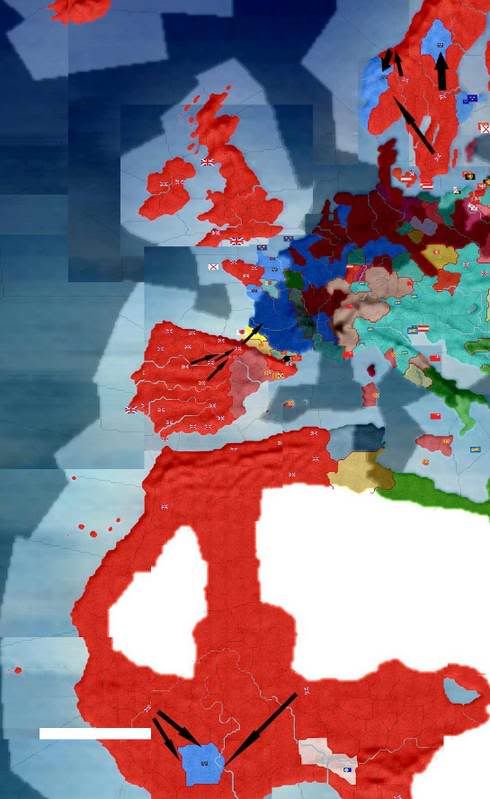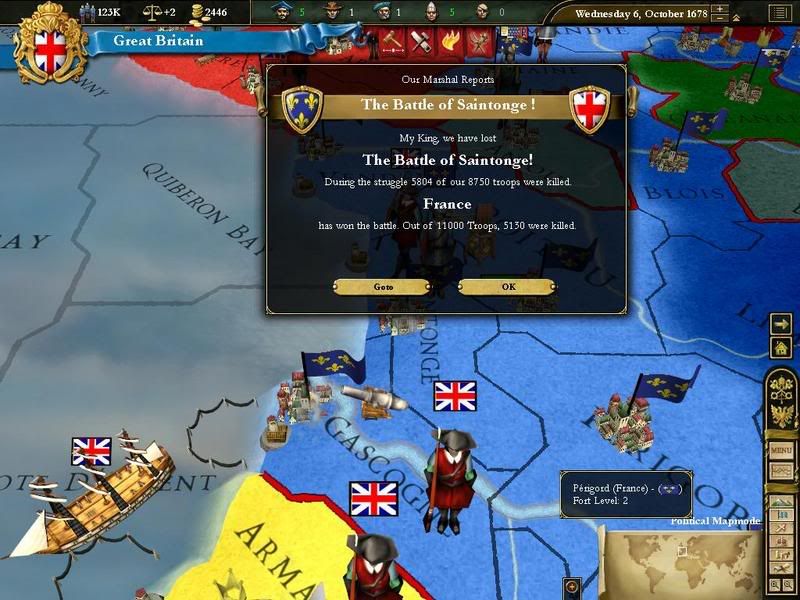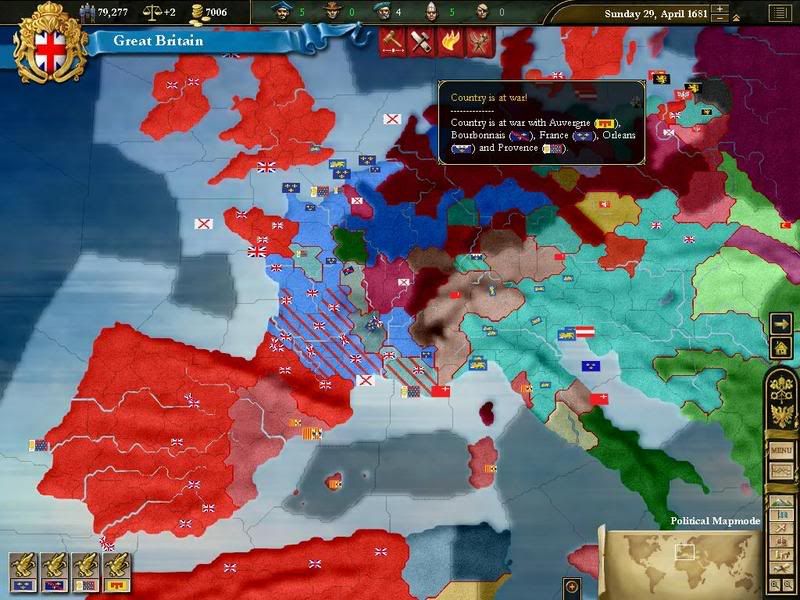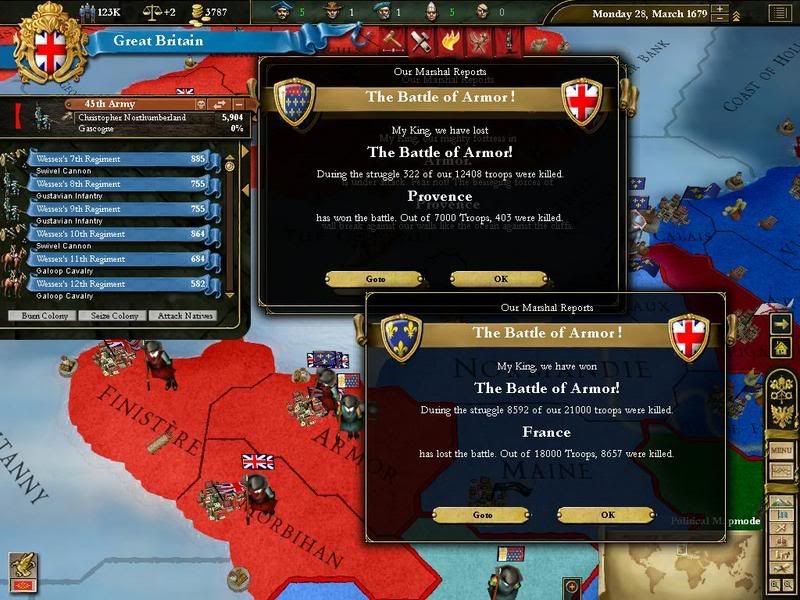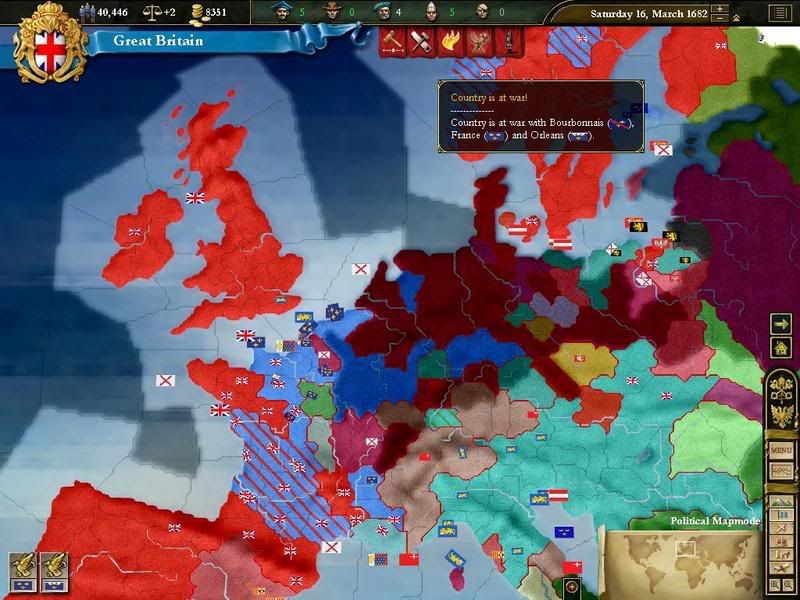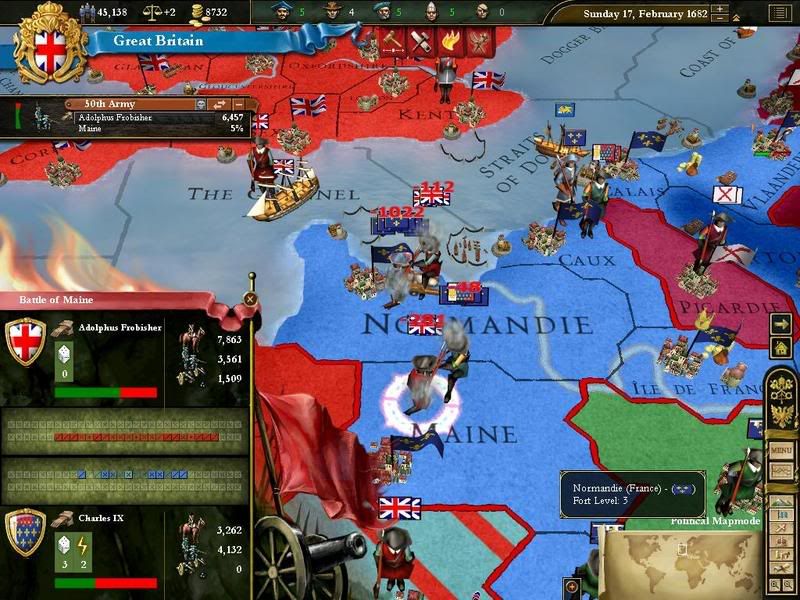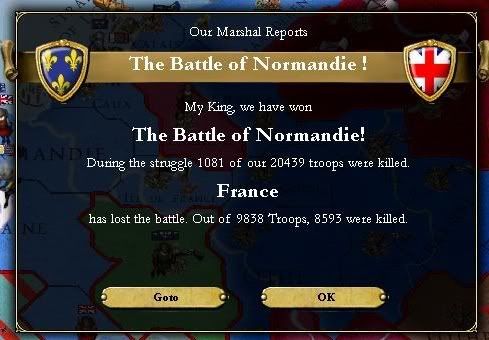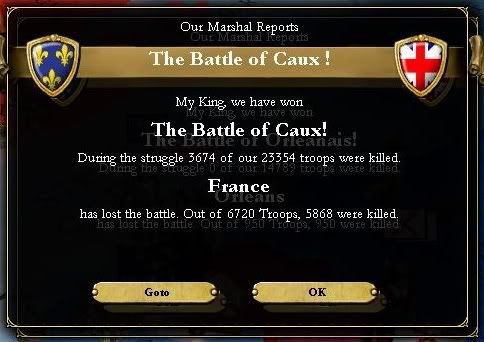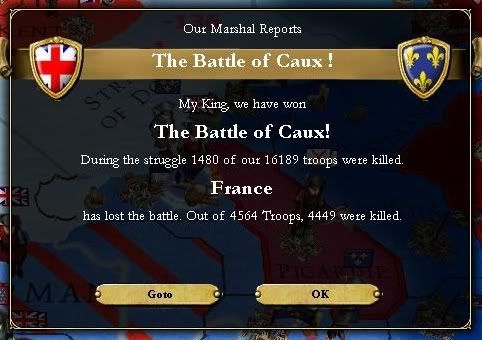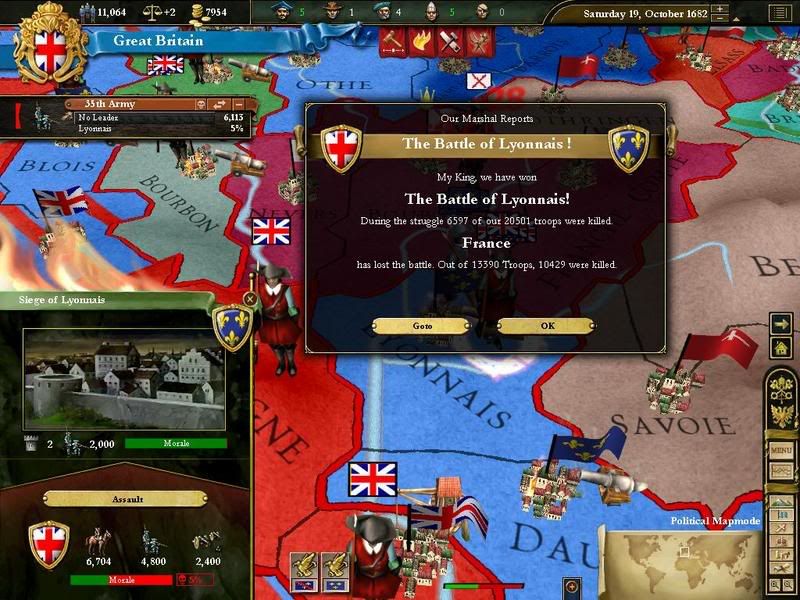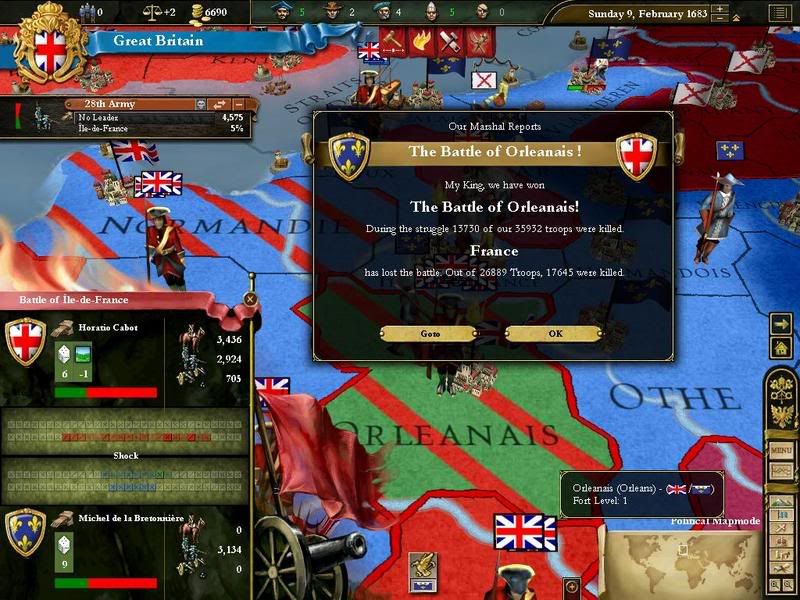Revisionist History (GreAAt BRitain)
“Sire, you must not do this, sire.” The look on the Duke’s face was grave; a mixture of apprehension and confidence.
Horatio Cabot was the Duke of all Wessex, Cornwall, Gloucestershire, Glamorgan, and old Wales. He was also the Kings greatest general in the field, appointed Commander of Operations for New France. The campaign was in dire straits before he took the field of Armor two years ago to the day. He had negotiated the surrender of Provence and secured the South of France under the threat of Jean III of France at the head of 40,000 troops rallied near Bourbonnais. Secretly he never had a plan to deal with that concentration of French forces, but his brilliant field command and theatre tactics forced the King of France to split his most grand army into tiny fragments to be picked apart in retreat. Bourbon itself was about to fall and he had successfully created a line in the south that was sweeping north. Before he devised this strategy it seemed as though Britain would have to negotiate a peace for a modest gain of ground. Under a series of other tacticians, France had been unwisely forced to retreat into two hard-points where they were threatening a turn in the tide of battle. At a loss of over two hundred thousand men, it would have hardly been a victory. George the Sixth practically owed his empire to the man, and in two days he would set out with fifteen thousand men to Caux, boxing the enemy behind the wall of Burgundy and ensuring the surrender of Orleans and Paris. This crippling victory would make France a mere memory, able to afford no more than the army of a modest Germanian state.
“The University will be built in yourn patrimony of Wessex! When I build this it will make the inheritance of your line a jewel of the Empire! How could you defy me? It is your greatest moment!”
“Sire, your plans indicate this will cost three ten hundreds ducats. Field me thirty ten hundreds boots on the ground with those monies and see what a patrimony I create, sire!”
“I have spoken and it is done… you would do better to listen before you recount my logic for you will have your army plus twenty ten hundreds and my gift within two summers.”
“And what of the armies of Burgundy, who itch to reverse our claim of France and become a world power? I do not need 30,000 or 50,000 to stop their plans but a hundred thousand, and the peace with France to solidify my hold of the countryside. We could not weather the assault of Burgundy whilst Poland and soon others threaten our claims of the east.”
“Indeed, but fear not for your reinforcements. You will move off of the Aragonite guard in order to counter any threat. My seers show there will be no threat from them any longer. You are free to utilize all the armies of the Empire.”
“Sire, and when Aragon seeks its independence when we are otherwise occupied, Sire?”
“I will likewise raise a fleet to support the Irish transport reserve in order to provide you with three admiralties to subjugate an errant Aragonite vassal.”
“Sire, if his majesty wishes the world to agree with further annexations, we must slow our progress, Sire.”
“I will soon declare myself, as recompense to the authority of the first in my line, and his eminence the Pope will back my decision and declare me the Holy Roman Emperor. You shall proceed no further than Caux and your heredity will enjoy all lands south of it for eternity. You will continue your watch of Aragon and your final charge is to secure their properties as well. Another will join battle with the remainder of France and Burgundy. That is all.”
1682 was a great year for the Empire. Duke Cabot had secured stunning back to back victories that would cow the French further behind the wall of Burgundy. In October he was ready to send word that he had conquered the French after he received a message that his plan of attack in Lyonnais had resulted in the greatest victory of the war.
In the winter of 1682, Jean III of France reached Orleans with an army of 40,000. Horatio Cabot did not want to lift the siege of Caux and so, leaving behind the bulk of his forces, marched his division directly through Paris and a guard of 8,000 with no more than 9,000 troops just to link up with the massive army he was converging to destroy the King. He would defeat the forces trying to impede him, but he was not able to lead the great battle. It was a hard-won victory for England, a loss of tens of thousands and one of his Generals, and the suddenly fearful Jean would flee farther and faster than he could reasonably pursue.
George VI would make good on his decree for a new University in honor of Duke Cabot, but as sure as the Duke was the day he first heard it from the King, he would receive no reinforcements. In turn, he would defy the King by not calling his reserves from the Iberian peninsula. Luckily for him the King did not lose face because the request had been in private and although angry, he had no power to do it himself. The Duke had the loyalty of the armies. He had won enough of a victory against France to demand good terms, but the King would not raise more soldiers because virtually all of the able-bodied men of England were already on the continent. It was a stalemate, with England in control of Paris and Orleans.
George VI had designs on all of Europe, but the possibility of doing that in his lifetime was limited. It would make more sense to relax the offensive for the rest of the war and take his enemies more slowly. There was no recourse for the King as the legislature was now against the war and he literally could not force the Duke to do anything. The stalemate in France on the ground and in England in the court would languish for another year, but the time would have to come for decisions to be made. The quiet defiance of Cabot was stirring other nobles into grumblings of their own. There would be no second Great War, the empire had nearly crumbled under the strain of fighting on so many fronts. In fact, ff France herself had had so audacious a leader as Jean III during those troubling times, surely they would have entered the fray and, although a great colonial power, France could have easily defeated the armies of England with her attention drawn to all corners of the world. Likewise, today the rhetoric of Burgundy was such that they all but outright threatened to crush the occupation force in Gelre. With them, France, and more revolts and invasions around the world, Britain would be lucky to come out in one piece. More echoes of Roman Empire-like dissolution filled the chambers of every court in Europe. Hope was the British threat would be no more in a mere decade. As chance would have it, the playing field would change dramatically with the actions of one French scholar.
The Duke of Wales had parlayed with representatives from the French many times after the defeat of Lyonnais. In January of 1683, the delegation was marginally larger and he hosted them in the tent-city outside of Paris that served as the forward base for the occupation. The parlay was always in French as it was still the practice of many of the English upper class to learn French and Italian. The French demands were typically as outrageous as their native dialect accent sounded to the ears of the average English noble. Once the delegation read off their demands for peace, the Duke cordially asked them once more to return as soon as Jean had decided to be more realistic. Despite the brevity of the meeting, they had often met and discussed terms far into the evening so it had become like a regular dinner party and he had invited them to join him this evening as well. His reasoning was that because one or the other French noble had appeared before him, perhaps he could eventually wear all of them down so they might force their King to reach an accord. He even went so far on a few occasions to retrieve items of sentiment or value for the nobles whose estates he occupied. This was possible because his conquest of the northwestern part of the country has been accomplished with very little looting unlike his predecessors, who had pillaged so much from the south of France that he was still dealing with the popular fallout of the peasants.
In the quiet of the evening, before they departed, he was pulled aside by a French scholar, a native of Ile-de-France named Philippe de Commines.
“Duke Cabot, I wish to thank you again for the retrieval of my manuscripts from the Sorbonne.” He leans closer, “And I have uncovered some information that you must know for the sake of both our peoples.”
“Come with me, my friend, let us have a drink in my drawing room.”
They enter the tent and the Duke dismisses a group of Colonels that had taken up positions around his bar. He tells the guards to leave as well and they walk away with noticeable silent protest.
Philippe explains, “I appreciate you speaking with me candidly and I hope you understand I want nothing more than to help bring our countries to a settlement, but I fear that your nation has to make a change first.”
“Go on,” the Duke says slowly.
“I have studied in many places in Europe, but you may not know that I was once the guest of several Universities in England before the war. A wise historian told me of a mystery he had uncovered about your own duchy…he told me that the line of succession in England was not correct. He told me that your family have a claim to the throne that goes back to the middle 15th century. The fire, the one that destroyed your family archives, coupled with the death of several of your line around the same time…He told me they were a conspiracy by the ancestors of the current King. Records all over the kingdom have been altered or destroyed. This conspiracy continued through the Great War, where more records were purposely destroyed in the chaos of that time. Great Duke Cabot, it continues still!” Philippe checks his voice as he realized it had risen during his explanation.
“It is known to some that I have had my disagreements with the King, but I didn’t realize it had reached the French court. Surely you would not tell me this if you didn’t think my loyalty was already in jeopardy. Otherwise your life would be forfeit right now. But you must know I would never put my country through a violent succession.”
The two men stare at each other for a minute.
“But this information helps me, assuming I can confirm it. From what you say, that task will be difficult.”
“Lord, with that I can help as well. You know I have certainly not been to England in recent times, nor would have any way to get a message there. So you can trust the sources I have to give you.”
With the help of the contacts Philippe gave him, the Duke soon uncovered enough evidence to claim the throne of England. He would not try to unseat the King, but neither would the King seek to become Emperor or goad the French into renewed conflict for the time being. He agreed privately to allow the Duke to wait for reinforcements in the coming years if the French did not want peace and to grant the Dukes family further titles and lands to begin to make up for the crimes of his dynasty. Secretly he tried a myriad of ways to kill the Duke. Secretly the Duke ensured that none of the Kings line would succeed upon his death.




